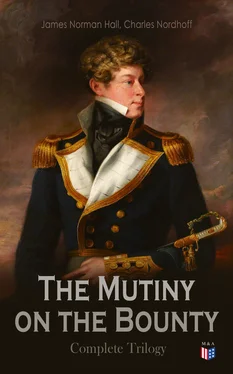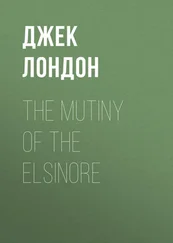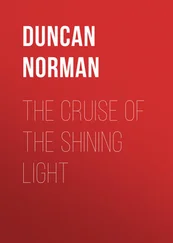“You came up there?” I asked in some chagrin.
“I have not cheated.”
“Let us rest for a little while, and then I shall try again.”
Tehani patted the root beside her. “Come and rest here,” she said.
I pulled myself up beside her, shaking the wet hair back from my eyes. Moved by common impulse, our two heads turned, and Tehani’s clear brown eyes smiled into mine. She turned away suddenly and all at once I felt my heart beating fast. Her hand was close to mine on the rough gnarled root; I took it gently, and since it was not withdrawn I locked my fingers in hers. She bent her head to gaze into the clear water, and for a long time neither of us spoke.
I gazed, not at the water, but at the beautiful girl at my side. She wore only a light kilt of white cloth, and her bare shoulder and arm, turned to me, were smooth as satin and of the most exquisite proportions. Her feet and hands, small and delicately made, might have been envied by a princess, and Phidias himself could have produced in cold marble nothing one-half so lovely as her young breasts, bared in all innocence. In her face I saw sweetness and strength.
“Tehani!” I said, and took her hand in both of mine.
She made no answer, but raised her head slowly and turned to me. Then all at once, and without a word between us, she was in my arms. The faint perfume of her hair intoxicated me, and for a time the beating of my heart made speech impossible. It was the girl who spoke first.
“Byam,” she asked, stroking my wet hair caressingly, “have you no wife?”
“No,” I replied.
“I have no husband,” said the girl.
At that moment I heard a woman’s voice calling from downstream: “Tehani! Tehani O!” The girl hailed back, bidding the caller to wait, and turned to me.
“It is only my servant who came ashore with me. I bade her wait at the mouth of the stream while I bathed.”
“You came from Tetiaroa?” I asked, with her head on my shoulder and my arm about her waist.
“No, I have been to Raiatea with my uncle. We have been two days and two nights at sea.”
“Who is your uncle?”
The girl turned to me in real astonishment. “You do not know?” she said incredulously.
“No.”
“Yet you speak our tongue like one of us! Strange men, you English—I have never talked with one of you before. My uncle is Vehiatua, of course, high chief of Taiarapu.”
“I have often heard of him.”
“Are you a chief in your own land?”
“A very small one, perhaps.”
“I knew it! Knew it the moment I laid eyes on you! Hitihiti would not take as his taio a common man.”
Again we fell silent, both conscious that our words reflected only the surface of our minds. “Tehani!” I said.
“Yes.”
She raised her head and I kissed her in the English fashion, full on the lips. We walked back to the cove hand in hand, while the servant followed us, her eyes round with wonder.
Vehiatua had come ashore and was at breakfast when we came to the cove. He was a nobly proportioned old man, with thick gray hair and a manner of cheerful, good-natured dignity. His retainers were grouped about him as he ate, serving him with breadfruit, grilled fish fresh from the coals, and bananas from a great bunch they had brought ashore. The old chief’s tattooing, which covered every portion of his body save his face, was the most beautiful and intricate I have ever seen. I was glad that I wore only my kilt, for it is discourteous to approach the great Indian chiefs with covered shoulders. Vehiatua gave no sign of surprise at sight of me.
“Eh, Tehani,” he called out affectionately to his niece. “Your breakfast is ready for you on board. And who is the young man with you?”
“The taio of Hitihiti—Byam is his name.”
“I have heard of him.” And then, turning to me courteously, Vehiatua asked me to join him at his meal. I sat down beside him, nothing loth, and answered his questions regarding Hitihiti and the Bounty, of which he had heard much. He expressed surprise at my knowledge of the Indian tongue, and I told him of my mission and how my taio had aided me.
“And now you and the others are settling on Tahiti to remain among us?” Vehiatua asked.
“For a long time, at any rate,” I replied. “It is possible that when the next British ship arrives, in two years or three, King George may send word that one or all of us must go home.”
“Aye,” said the old aristocrat, “one must obey one’s king!”
Presently Tehani came ashore, her breakfast over and her toilet made, very different from the young tomboy who had beaten me at diving so short a time before. Her beautiful hair, dried in the sun, combed out and perfumed, was dressed in the Grecian fashion, low on the nape of her neck. Her mantle of snow-white cloth was draped in classic folds, and she walked ahead of her little band of women with an air of dignity few English girls of sixteen could have assumed. The chief gave me a nod and rose to his feet.
“Let us go to the house of my kinsman,” he said.
A stout muscular fellow crouched before Vehiatua, hands braced on his knees. The chief vaulted to his shoulders with the ease of long practice, and the human horse stood upright with a grunt. Vehiatua, Teina, and two or three other great chiefs of those days were never permitted to walk, for the touch of their feet rendered a commoner’s land theirs. Wherever they went, save in their own domains, they were borne on the backs of men trained to the task.
With Tehani at my side, I followed her uncle down the beach, walking on the hard moist sand at the water’s edge. As we passed the encampment of fishermen they hastened to throw off the mantles from their shoulders and seat themselves on the sand. To remain standing while a high chief passed would have been the greatest of insults.
“Maeva te arii!” was their greeting. (Hail to the chief!)
“May you live,” said Vehiatua affably; “and may your fishing prosper!”
Old Hitihiti met us before his door, throwing off his mantle and stepping forward with bare shoulders to greet his friend. A meal was being prepared, and though our visitor had just eaten a prodigious quantity of food, he expressed his willingness to share in a second breakfast. Tehani and Hina knew each other well and seemed to have much to talk over. From the glances Hina cast at me from time to time, I suspected that Tehani was telling her of our meeting in the stream.
Toward noon, when the others had sought out shady places in which to spread their mats for a nap, I found my taio awake. He was alone, under his favourite hibiscus tree close to the beach, and I told him of my meeting with the girl, and that I loved her too dearly for my peace of mind.
“Why not marry her, if she is willing?” asked Hitihiti, when I had done.
“I think she might be willing, but what would her parents say?”
“She has none; both are dead.”
“Vehiatua then.”
“He likes you.”
“Very well. But suppose we were married, and an English ship came with orders that I must go home.”
My taio shrugged his great shoulders in despair. “You English are all alike,” he said impatiently; “you make yourselves miserable by thinking of what may never happen! Is not to-day enough, that you must think of to-morrow and the day after that? The thought of an English ship makes you hesitate to marry the girl you fancy! And ten years, or twenty, might pass before another ship arrives! Enough of such talk! Yesterday is gone; you have to-day; to-morrow may never come!”
I could not help smiling at my old friend’s philosophic outburst, not without its grain of sound common sense—called “common” because it is so rare. Worry over the future is without doubt the white man’s greatest strength and greatest weakness in his quest of happiness—the only conceivable object in life. To the people of Tahiti, worry over the future was unknown; their language indeed contained no word with which to express such an idea.
Читать дальше











